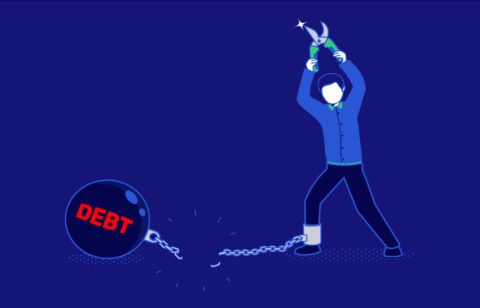Did you graduate a few years ago owing $20,000, $30,000 or even more on your student loans? That can be a pretty big burden when you’re just starting out in your career and are a low earner. Or worse yet, maybe you haven’t been able to find a job in your field of study and have become one of those “underemployed” – a fancy way of saying you’ve had to settle for working as a barista at Starbucks or as a call center employee. But then, Eureka! You receive a call from a friendly-sounding fellow who says that no sweat, he can get you out from under that load of student debt. He may even say he can get you a debt consolidation loan that will lighten your load and at zero interest. Would that sound like a great deal or what?
Watch out for predators
Former Presidential advisor Rahm Emanuel once said, “never let a crisis go to waste.” This could be the slogan of the scam artists that have picked up on the student debt crisis and are not letting it go to waste. These scamsters had seen that many young people are feeling desperate and confused about their student loans and have created new student debt relief scams you could fall for if not careful.
The scams
There are two very popular scams. The first is debt relief firms that make big promises of what they can do to restructure your loans so long as you are willing to pay their upfront fees. Some of these fees are so steep they would be equal to a very high interest rate if they were applied, say, to a $10,000 student loan. These companies often want you to turn over your personal information including your passwords, Social Security numbers and the personal identification (PIN) numbers of your student loan accounts.
The second type of scam is the loan consolidation scam. This is where they promise to get you a federal debt consolidation loan if, again, you agree to their fees. One of the easiest ways to spot this scam is if they ask you to provide a power of attorney. It‘s just not routine to have to provide a power of attorney to get a loan. As a matter of fact there’s never a reason to do this unless there is a clear need for it such as dementia or Alzheimer’s. The reason why a shady debt relief agency wants your power of attorney is so that it can apply for a federal consolidation loan for you. They’ll ask for all of the information that you would have to input into the website of FedLoan Servicing and then complete the application for you acting as if it were the borrower. But there is only one way to consolidate loans with a Direct Federal Consolidation loan. This is via the online consolidation application available on the US Department of education’ s website. (loanconsolidation.ed.gov). And completing this application is very simple and something you could certainly do yourself for free.
Second, a scam artist may try to get you to believe you that you can’t consolidate your loans yourself. In truth the Fedloan Servicing application is pretty straightforward. And Fedloan Servicing improved it recently to make applying for the loan even easier. It will take you just 30 minutes or less. If you have any questions about the application process you can always call Fedloan Servicing directly and get help.
A “unique” service
A second sign that you are probably speaking to a scam artist is if he offers you the “unique service” of a year of no payments after you consolidate with the new loan. The fact is that there is nothing exclusive about this at all. All the scam artist is doing is putting your loans into forbearance. Again this is something you can do yourself online free at the Fedloan Servicing website.
Third, you may be talking to a scamster if he offers only loan consolidation. He will push this as the only solution regardless of what student debt issue you have. In doing so, he neglects to tell you there are options besides consolidating. In fact, there are a number of different repayment programs available to you even if you’re a bit past due on your payments.
He’s very pushy
Shady debt relief agencies also tend to be very pushy and use sales tactics. They will try to rush you into consolidating your loans and might even have a “special offer” to get you to make a fast financial decision. It’s important to keep reminding yourself that what they are most concerned about is their financial bottom line and not your best interests.
Most of these agencies will also be less than honest or ambiguous about what they charge. They will try to finesse the issue by telling you that their fees vary based on the amount of work involved and how much debt you have. They may also claim you will need to pay monthly fees in addition to an upfront lump sum payment– all just to consolidate your debts. If the so-called debt relief agency is ambiguous or less than honest about its fees, this is a huge warning sign regarding its lack of ethics.
Finally, many of these agencies will have a website they hide behind. You will not see pictures of their representatives or find direct phone numbers you could use to contact them. They don’t want to form a personal relationship with you. Their goal is to preserve their anonymity so that if you run into trouble or change you mind you can’t contact them.
What you could do yourself
As you have read if your goal is to consolidate your loans with a Direct Federal loan this is a fairly simple process you can do yourself. You can also restructure your debt yourself by changing to a different repayment program. To do this you will need to first go to the federal student loan database (https://www.nslds.ed.gov/) to get information about your loans such as their type, when the funds were disbursed, what you’ve paid so far and how much you still owe. You should save this information to your student debt portfolio for future reference.
With this information in hand you will need to next check out the federal loan repayment (https://studentaid.ed.gov/repay-loans#repayment-plans) programs to determine which ones you would qualify for and would give you the best terms and lowest monthly payments. One the most popular of these is Pay As You Earn. You might have read about this program recently when Pres. Obama signed an executive order making about 1.4 million more people eligible. If you are one of these people you could see your monthly payments capped at 10% of your disposable income.
If you find you’re ineligible for Pay As You Earn there is another program called Graduated Repayment. If you are currently a low earner but know that your income will increase in the years ahead this can be a very good option. It allows you to start with low payments that gradually increase every two years.
There is also a program called Income-based Repayment where your monthly payments would be capped at 15% of your disposable income – again if you would be eligible.
The last step
If you are able to find a better repayment program than what you currently have, the final step in the process is to contact your lender and discuss this with it. Your representative should be happy to help you through the process of changing repayment programs and might even suggest a better option than the one you chose.
Best of all, none of this will cost you a single cent let alone a big upfront payment or monthly fees.







